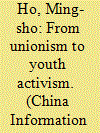| Srl | Item |
| 1 |
ID:
175163


|
|
|
|
|
| Summary/Abstract |
This article examines two major protests related to working-hour reforms in Taiwan in 2000 and 2016–18, paying particular attention to the shift in the composition of protesters from union members to youth activists. The decline in mass membership and the failure to consolidate a national federation have diminished the political presence of labour unions. The emergence of youth protest movements, both before and after the 2014 Sunflower Movement, made possible the advent of Taiwan’s youth as political actors. The reconfiguration of Taiwan’s working hour politics has paralleled the global transition from the classical organization-based collective action to the digitally enabled ‘connective action’. The concluding section provides reflections on the impacts as well as the limitations of this newer form of labour politics.
|
|
|
|
|
|
|
|
|
|
|
|
|
|
|
|
| 2 |
ID:
167173


|
|
|
|
|
| Summary/Abstract |
This paper revisits the rise of industrial unionism in Korea in the wake of the 1997 financial crisis at the turn of the twenty-first century. By closely investigating the reorganization of labour unionism in the context of neoliberalization, it challenges the alleged converging impact of neoliberal rhetoric or hegemony on industrial relations. To this end, this paper raises following substantive questions: How far did Korea’s industrial unionism advance under the new economic circumstances and how stable was it? More importantly, what were the fundamental factors behind such re-formation of labour unions? This paper finds that the transformation of labour unions in Korea is a mixture of the rise of industrial unionism and the persistence of enterprise unionism, that is to say a precarious progress of industrial unionism. It argues that behind the unstable development of industrial unionism in Korea were state-fostered legacy of power imbalance within labour in favour of enterprise unions, especially at chaebols, and continuing state intervention in the re-formation of labour unions in the neoliberal era. Finally, it argues that the seemingly sweeping neoliberal rhetoric or hegemony does not override the long-standing political-economic institutions of industrial relations and the leverage of the state, but it is filtered and reified by them.
|
|
|
|
|
|
|
|
|
|
|
|
|
|
|
|